
A watercolour wash is a thin application of pigment mixed with water; there are many types, each with unique effects. A glaze is when a wash is placed over existing dried washes to strengthen colour and tone.
The transparency created by layering and mixing colours is unique to watercolour painting and, with a bit of practice, can produce beautiful results. Both washes and glazes require the same three ingredients: water, pigment, and paper.
The strength of a wash will vary depending on the proportion of water to pigment. For example, for rich colour you would add more pigment, or to achieve delicate colour, more water is added to produce a weaker mix. Glazes, on the other hand, are always weak and transparent, as their purpose is to alter subtly the colour or tone of layers that they are applied to. The thinness of a glaze will affect the way it dries and the effect this produces.
Washes can be applied to dry, damp, or wet paper – this will affect the outcome, as will the paper’s texture, weight, and sizing. The smoother the surface, the better it will show detail, while a rougher surface allows for more characterful washes and looser detail. The paper’s absorbency also affects the result. Heavier, more absorbent paper produces softer effects than lighter paper, which dries more quickly.
You can also control the effect of your wash by tilting the paper after applying a layer of colour. Rough paper often causes the pigment in the wash to granulate (form into particles); smoother surfaces tend to allow the paint to run freely in all directions when tilted, so control is needed.
MULTILAYERING WASHES
Esta historia es de la edición March 2022 de Artists & Illustrators.
Comience su prueba gratuita de Magzter GOLD de 7 días para acceder a miles de historias premium seleccionadas y a más de 9,000 revistas y periódicos.
Ya eres suscriptor ? Conectar
Esta historia es de la edición March 2022 de Artists & Illustrators.
Comience su prueba gratuita de Magzter GOLD de 7 días para acceder a miles de historias premium seleccionadas y a más de 9,000 revistas y periódicos.
Ya eres suscriptor? Conectar

Still life IN 3 HOURS
Former BP Portrait Award runner-up FELICIA FORTE guides you through a simple, structured approach to painting alla prima that tackles dark, average and light colours in turn
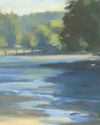
Movement in composition
Through an analysis of three masterworks, landscape painter and noted author MITCHELL ALBALA shows how you can animate landscape composition with movement
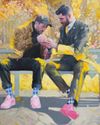
Shane Berkery
The Irish-Japanese artist talks to REBECCA BRADBURY about the innovative concepts and original colour combinations he brings to his figurative oil paintings from his Dublin garden studio

The Working Artist
Something old, something new... Our columnist LAURA BOSWELL has expert advice for balancing fresh ideas with completing half-finished work
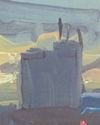
Washes AND GLAZES
Art Academy’s ROB PEPPER introduces an in-depth guide to incorporating various techniques into your next masterpiece. Artwork by STAN MILLER, CHRIS ROBINSON and MICHELE ILLING

Hands
LAURA SMITH continues her new four-part series, which encourages you to draw elements of old master paintings, and this month’s focus is on capturing hands

Vincent van Gogh
To celebrate The Courtauld’s forthcoming landmark display of the troubled Dutch master’s self-portraits, STEVE PILL looks at the stories behind 10 of the most dramatic works on display
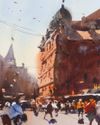
BRING THE drama
Join international watercolour maestro ALVARO CASTAGNET in London’s West End to paint a dramatic street scene
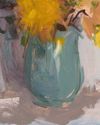
Serena Rowe
The Scottish painter tells STEVE PILL why time is precious, why emotional responses to colour are useful, and how she finds focus every day with the help of her studio wall

Bill Jacklin
Chatting over Zoom as he recovers from appendicitis, the Royal Academician tells STEVE PILL about classic scrapes in New York and his recent experiments with illustration